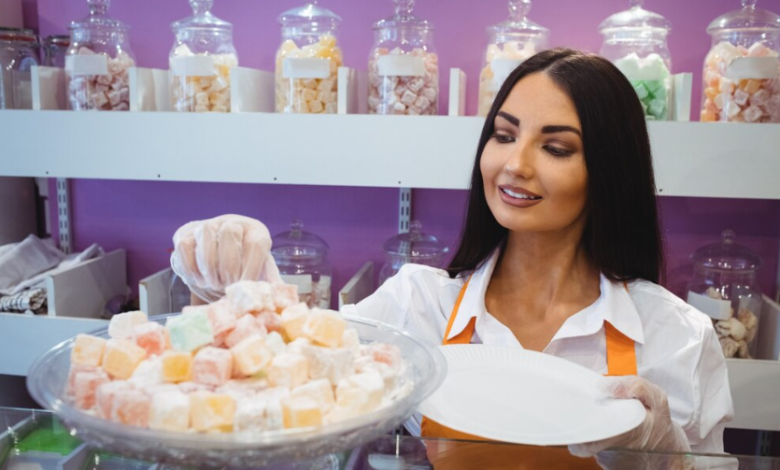Candy Store Franchises vs. Independent Shops: Which Is Better?

Understanding Candy Store Franchises
What Defines A Candy Store Franchise?
So, what exactly is a candy store franchise? Basically, it’s like buying a ready-made business. You get to use a well-known brand name, their established business model, and their proven methods. Think of it as a shortcut to opening your own candy shop, but with training wheels. You’re not entirely on your own; you have the support of the parent company. This can be a big plus, especially if you’re new to the candy business or just starting out as an entrepreneur. It’s more than just slapping a logo on a storefront; it’s about following a system.
Benefits Of Joining A Franchise
There are some pretty solid reasons why people choose to go the franchise route. For starters, you get instant brand recognition. People already know and trust the name, which can bring in customers from day one. You also get access to training and support, which can be a lifesaver when you’re figuring things out. Plus, franchises often have better buying power, meaning you can get supplies at a lower cost. And let’s not forget the marketing support – they usually have a plan in place to help you attract customers. An ice cream franchise can be a good example of this, as they often have established supply chains and marketing strategies.
Here’s a quick look at some potential benefits:
- Established brand recognition
- Training and ongoing support
- Marketing assistance
- Bulk purchasing power
Joining a franchise can reduce the risks associated with starting a new business. The franchisor provides a proven business model, training, and support, which can increase the likelihood of success.
Challenges Faced By Franchise Owners
It’s not all sunshine and lollipops, though. There are definitely some downsides to consider. One of the biggest is the lack of independence. You have to follow the franchise’s rules and guidelines, which can limit your creativity and flexibility. You also have to pay franchise fees and royalties, which can eat into your profits. And if the parent company makes a bad decision, it can affect your business, even if you’re doing everything right. It’s important to weigh the pros and cons carefully before jumping in. With candy store franchises, you might find yourself restricted in the types of candy you can sell or the store layout you can use. It’s a trade-off between independence and a proven system.
| Challenge | Description |
| Lack of Independence | Franchisees must adhere to the franchisor’s rules and guidelines, limiting their ability to make independent decisions. |
| Franchise Fees | Initial franchise fees and ongoing royalties can significantly impact profitability. |
| Dependence on Brand | The success of the franchise is tied to the reputation and decisions of the parent company. |
The Appeal Of Independent Candy Shops
Unique Offerings And Customization
Independent candy shops have a real chance to stand out. Unlike candy store franchises that often stick to a set menu, these shops can really get creative. They can try out weird flavor combos, offer candies you just can’t find anywhere else, and even make stuff right in the store. Think small-batch chocolates, custom-made gummies, or even vintage candies that bring back memories. It’s all about making something special that people will remember.
Building A Local Brand
One of the coolest things about running an independent candy shop is the chance to become a real part of the community. You’re not just another store; you’re the candy store on the block. This means you can team up with local schools for fundraisers, sponsor little league teams, or even just host events in the shop. It’s about building relationships and becoming a place people love to visit. Plus, you get to put your own stamp on everything, from the store’s design to the products you sell. It’s way more personal than an ice cream franchise or other candy store franchises.
Flexibility In Operations
Running your own candy shop means you get to call the shots. Want to stay open late on weekends? Go for it. See a new candy trend you want to try? Order it up. This kind of flexibility is a big deal. You’re not stuck following someone else’s rules or waiting for corporate approval. You can adapt to what your customers want and make changes on the fly. It’s a lot more work, sure, but it also means you have the freedom to build the candy shop of your dreams.
Independent shops can really cater to their local market. They can stock items that are popular in the area, offer personalized service, and create a unique atmosphere that reflects the community’s values. This level of customization is hard to match with a franchise model.
Financial Considerations For Candy Stores
Startup Costs For Franchises
Starting a candy store, especially through candy store franchises, involves significant initial investment. Franchise fees can range widely, often from $20,000 to $50,000 or more, just for the right to use the brand name and operating system. Then you have to consider the costs of securing a location, which can include leasehold improvements, permits, and initial inventory. Don’t forget equipment like display cases, refrigeration units (especially if you’re thinking about an ice cream franchise), and point-of-sale systems. It all adds up quickly.
Here’s a rough breakdown:
- Franchise Fee: $20,000 – $50,000+
- Leasehold Improvements: $10,000 – $50,000 (depending on location)
- Initial Inventory: $15,000 – $30,000
- Equipment: $10,000 – $25,000
- Working Capital: $5,000 – $15,000
It’s easy to underestimate the initial costs. Make sure you have a solid business plan and secure adequate funding before jumping in. Unexpected expenses always pop up.
Operating Expenses For Independents
Independent candy stores have a different set of financial considerations. While you avoid franchise fees, you’re responsible for all operating expenses. Rent is a big one, as is utilities. Inventory management is crucial; you need to balance having enough stock to meet demand without overspending and risking spoilage. Marketing and advertising costs can also add up, especially when you’re trying to build a brand from scratch. Employee wages, insurance, and licenses are other ongoing expenses to factor in.
Consider these typical monthly expenses:
- Rent: $2,000 – $8,000 (location dependent)
- Inventory: $3,000 – $10,000
- Utilities: $500 – $1,500
- Marketing: $200 – $1,000
- Salaries: $2,000 – $5,000 (depending on staff size)
Profit Margins And Revenue Streams
Profit margins in the candy business can vary widely depending on the type of product, pricing strategy, and location. Some candies have higher markups than others. Revenue streams can include in-store sales, online orders, and even special events or catering. For candy store franchises, a portion of your revenue will typically go to the franchisor as royalty fees. Independent stores keep all the profits but have to work harder to attract customers. Diversifying your product line, such as adding ice cream or gourmet chocolates, can boost revenue. Also, seasonal sales, like Halloween and Valentine’s Day, can significantly impact your bottom line. Understanding your costs and pricing your products effectively is key to profitability. Don’t forget to factor in potential waste from expired or damaged goods. A good point-of-sale system can help track inventory and sales data to make informed decisions.
Marketing Strategies For Candy Stores
Franchise Marketing Support
When you sign up for candy store franchises, one of the big perks is the marketing support that comes with it. Franchises usually have established marketing plans and materials that you can use right away. This can save you a lot of time and money compared to starting from scratch. They often handle national advertising campaigns, which can really boost brand awareness.
- Pre-made marketing templates
- National advertising campaigns
- Brand guidelines to ensure consistency
Franchise marketing support can be a real game-changer, especially if you’re new to the business world. It’s like having a whole marketing team at your disposal, without having to hire one yourself.
Local Marketing Tactics For Independents
If you’re running an independent candy shop, you’ve got to get creative with your local marketing. Since you don’t have the backing of a big franchise, it’s all about connecting with your community. Think about sponsoring local events, partnering with nearby businesses, and getting involved in neighborhood activities. Word-of-mouth is huge, so make sure your customers are happy and spreading the word.
- Sponsor local events (festivals, school fundraisers)
- Partner with nearby businesses (coffee shops, restaurants)
- Offer discounts to local residents
Leveraging Social Media
Social media is a must for any candy store, whether it’s a franchise or independent. Platforms like Instagram, Facebook, and TikTok are perfect for showing off your sweet treats and engaging with customers. Run contests, post mouth-watering photos, and use relevant hashtags to reach a wider audience. Don’t forget to respond to comments and messages promptly to build relationships with your followers. For an ice cream franchise, showing off the variety of flavors and toppings is a great way to attract customers.
- Run contests and giveaways
- Post high-quality photos and videos
- Use relevant hashtags
Customer Experience In Candy Retail
Franchise Consistency Vs. Independent Charm
When you walk into a candy store franchise, you generally know what to expect. That’s the beauty of it. The layout, the products, even the staff interactions are usually standardized. This can be a big plus for customers who like predictability. Think of it like an ice cream franchise; you know the flavors will be the same whether you’re in Florida or Washington.
Independent shops, on the other hand, thrive on their unique charm. They might have quirky decorations, locally sourced candies, or a super-friendly owner who remembers your name. It’s a different vibe, and some people really dig that.
Creating Memorable Experiences
Regardless of whether it’s a candy store franchises or an independent shop, creating a memorable experience is key. This goes beyond just selling candy. It’s about making people feel good when they walk through the door. Here are some ideas:
- Offer samples of new or unusual candies.
- Host events like candy-making demonstrations or themed parties.
- Create a visually appealing store layout that’s fun to explore.
A great customer experience can turn a one-time visitor into a loyal fan. It’s about building a connection and making people feel like they’re part of something special. This can be achieved through personalized service, unique product selections, and a welcoming atmosphere.
Customer Loyalty Programs
Loyalty programs are a great way to keep customers coming back. They can be simple or complex, but the basic idea is to reward repeat business. Here are a few options:
- Points-based system: Customers earn points for every purchase, which they can redeem for discounts or free candy.
- Tiered system: Customers move up to higher tiers based on their spending, unlocking more exclusive benefits.
- Birthday rewards: Offer a special discount or free treat on customers’ birthdays.
Here’s an example of how a points-based system might work:
| Spending | Points Earned | Reward |
| $10 | 10 | 10% off next purchase |
| $25 | 25 | Free small bag of candy |
| $50 | 50 | 20% off entire order |
Regulatory And Compliance Issues
Franchise Regulations And Requirements
When you’re thinking about opening a candy store franchises, it’s not just about the sweets; there’s a whole bunch of legal stuff you need to get your head around. Franchises come with a set of rules and regulations laid out by the franchisor, and you’ve got to stick to them. This can include everything from how you run the store to what products you can sell. You’ll also need to understand the Franchise Disclosure Document (FDD), which is basically a massive document that tells you everything you need to know about the franchise. It’s a good idea to get a lawyer to look over it, because it can be pretty complicated. Also, don’t forget about federal and state regulations that govern franchises, which can vary quite a bit depending on where you are.
Local Health Codes For Independent Shops
If you’re going the independent route, you’ve got more freedom, but you’re also responsible for making sure you’re following all the local health codes. This means keeping your store clean, storing food properly, and making sure your employees are trained in food safety. Health inspections are a regular thing, and if you don’t pass, you could get fined or even shut down. It’s a good idea to check with your local health department to find out exactly what’s required. For example, you might need to have specific types of flooring, hand-washing stations, or pest control measures in place. It’s all about keeping your customers safe and healthy.
Navigating Licenses And Permits
Whether you’re opening a franchise or an independent shop, you’re going to need licenses and permits. This can include a business license, a food handler’s permit, and maybe even a sign permit. The exact requirements will depend on where you’re located and what kind of business you’re running. Getting these licenses can take time, so it’s best to start the process early. You might need to fill out applications, pay fees, and even attend hearings. It can be a bit of a headache, but it’s a necessary part of opening a candy store. And if you’re planning to sell ice cream, remember that an ice cream franchise might have specific requirements for permits related to dairy products.
Future Trends In The Candy Industry
Emerging Flavors And Products
The candy world is always changing, and it’s fun to see what’s coming next. We’re seeing more unusual flavor combinations, like spicy and sweet, or savory and sweet. Think chili-infused chocolate or sea salt caramels. Also, keep an eye out for candies with added health benefits, like vitamins or probiotics. People want treats that are a little less guilty.
- Exotic fruit flavors (dragon fruit, yuzu)
- Botanical infusions (lavender, rose)
- Functional candies (energy, sleep aids)
Sustainability In Candy Production
More and more, people care about where their food comes from and how it’s made. This is true for candy too. Companies are trying to use more sustainable ingredients, like ethically sourced cocoa and sugar. They’re also working on reducing packaging waste. It’s not just good for the planet; it’s what customers want.
- Eco-friendly packaging options
- Fair trade and direct trade sourcing
- Reducing carbon footprint in production
Consumers are increasingly aware of the environmental impact of their purchases. Candy companies that prioritize sustainability will likely gain a competitive edge.
Technology’s Role In Retail
Technology is changing how we shop for everything, including candy. Online shopping is huge, and candy stores need to have a good online presence. Also, things like personalized candy subscriptions and interactive displays in stores are becoming more common. Even for an ice cream franchise or candy store franchises, technology is important.
- Online ordering and delivery services
- Personalized candy subscriptions
- Interactive in-store displays
Final Thoughts
In the end, choosing between a candy store franchise and an independent shop really comes down to what you want. Franchises can give you a head start with their brand and support, but you might feel boxed in by their rules. On the flip side, running your own shop means more freedom to be creative, but it can be tough to get noticed without that big name behind you. Think about what fits your style and goals. Whether you go with a franchise or start from scratch, both paths have their ups and downs. Just make sure you pick what feels right for you.






